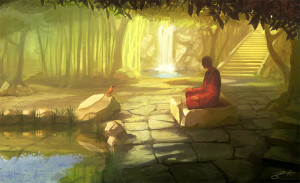Only two miracles are worth seeing:
The miracle of loving
And the miracle of forgiving.
– Sri Chinmoy 1
Spiritual leaders from many traditions have urged us to forgive others for their wrongdoings, and also to forgive ourselves for our own mistakes. A story about Lord Buddha recounts that he was sitting with his followers when a critic came up to him and spit on him. The Buddha’s followers wanted to punish the man, but the Buddha merely asked him what he was trying to say. The next morning the same critic returned and threw himself at the Buddha’s feet.
Resentment and Anger: The Heavy Load
Why do we have to be reminded to forgive? It is because we do not find it easy to forgive; it does not please us to forgive; it does not come naturally to forgive. Indeed, as the above quotations indicates, forgiveness is a miracle. Yet, if we are wise, we want to forgive – not only because it is morally right, but also because it is essential to our own well-being. It is a heavy burden, observes Sri Chinmoy, to harbor the resentment and anger that accompany failure to forgive. Sri Chinmoy asks us to wonder how we can run towards our important goals when we carry such a heavy load. 2
Father, forgive them, for they know not what they do.3
Lincoln’s Act of Forgiveness — A Victory!
One piece of the history of the great American president Abraham Lincoln shows how the practice of forgiveness can lead to the achievement of important goals: Lincoln was in the running for nomination to the Senate from Illinois in 1858. In the political system of the day, senators were nominated by state legislatures, not by popular vote as they are today. Lincoln had 41 votes, and another politician — Lyman Trumbull — had only 5. But the leader of Trumbull’s faction refused to yield to the larger group.
To promote the good of his party, Lincoln removed his own name, allowing Lyman Trumbull to become Senator from Illinois. Lincoln attended Trumbull’s victory party with a big smile and a warm handshake for Trumbull. When the convention convened to select the presidential nominee in 1860, the former leader of Trumbull’s faction was one of Lincoln’s most important Illinois supporters! As we now know, Lincoln was nominated and won the election! 4
The Workings of the Mind
Unfortunately, when I look into the workings of my own mind, I find that, rather than forgiveness, what seems to come naturally is a kind of morbid dwelling on the hurts that I have received — a long-simmering pot of resentment. The ladle to stir this pot is always handy, and when in a low mood, or bored, or the recipient of a particularly grievous insult, I pick up the ladle with relish. I imagine that I am not alone in this unfortunate tendency. What can we do to put the lid on this pot, to nudge ourselves towards the enactment of the miraculous? This brief article can be regarded as documentation of a work in progress: Lack of forgiveness has been a big issue for me, and I am hoping that by addressing it I will make some progress towards becoming more forgiving.
To become a happiness-fountain
I must forgive those
Who ruthlessly hurt me
Every day.
– Sri Chinmoy 5
Since lack of forgiveness is closely related to anger, when I feel “righteously” angry, I am far from forgiving. In his book entitled Anger: Wisdom for Cooling the Flames, the Zen Buddhist monk Thich Nhat Hanh advises that whenever we feel angry, we should recognize that right underneath the feeling of anger is the feeling of hurt.6
In my experience this has turned out to be always true; and although a little painful to admit, it is usually helpful to me in my efforts to throw cold water on the flames. When we feel that others have done us wrong, my experience as Sri Chinmoy’s student suggests that we remind ourselves that, in their shoes, we would have done as bad or worse; this approach is also uniformly helpful.
Illumining Anger
Sri Chinmoy also says: “There are two ways to illumine anger. One way is to enlarge your heart. If you have been wronged, use your power of identification. Feel that it is you yourself, or an extended part of your own consciousness, that has done the wrong thing. The sooner you can rid yourself of the idea that somebody else has done something to you, the better off you will be.”7
Prayer and Meditation: Effective Guides
Prayer and meditation are, undoubtedly, two of the most effective guides to the royal path to forgiveness, since they are both conducive to enlarging the heart and making us feel that we are part of a larger whole. An older African-American woman, who lived in Birmingham, Alabama, during the sixties when a church with children inside was burned by white bigots, was talking on National Public Radio a few years ago about her family’s reaction to those events. She said that because the family prayed sincerely, they were able to forgive the perpetrators and include them in their prayers for forgiveness. In the face of shockingly unprovoked and unjust wrongdoing, this devout Christian family was able to enlarge their hearts enough to wish well to the attackers.
When we meditate, our mind is inundated with peace, and when we have peace of mind, we are in a position to conquer our anger. – Sri Chinmoy. 8
Meditation opens us to hearing the voice of our inner pilot, the part of us that most reliably leads us to illumined feelings and behaviors. Once, long ago, after a most painful telephone conversation with my ex-husband, I walked away from the conversation still feeling upset, and entered a large outdoor space where Sri Chinmoy was in silent meditation with a large group of his students. As I walked through the group to find a seat, just looking at the peaceful faces of my fellow students, without making any personal effort of my own, was enough to completely obliterate my angry and revengeful feelings!
Illumining Power of Meditation
There have been many, many times when I sat down to meditate with the awareness of a problem that seemed to be insurmountable, and either in the course of the meditation or within a few days, the solution presented itself, sometimes in an unexpected way. I admit, though, that my meditations do not always have the desired effect immediately. There have been times when I have not had a “good” meditation; there have been extended periods when I have meditated daily and yet the same problem has persisted and persisted.
So far, though, most problems have eventually yielded to the healing and illumining powers of meditation. My difficulties with forgiveness are bound to be surmounted by the same force.


